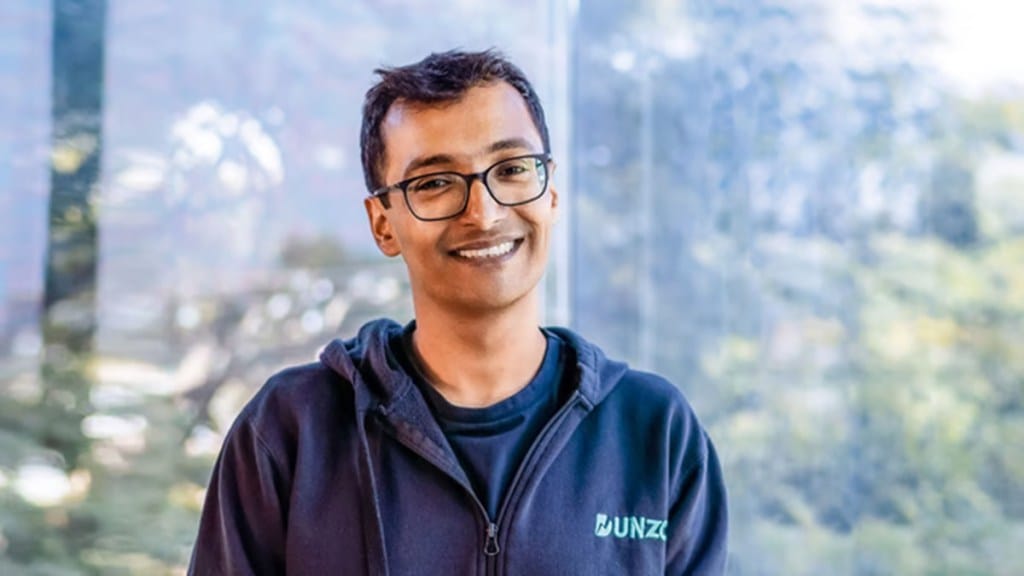In the streets of Bengaluru in 2014, Kabeer Biswas used to coordinate deliveries through WhatsApp groups, personally responding to customer requests and managing the first 8,000 deliveries of what would become Dunzo.
The rise was spectacular for Biswas. By 2016, Dunzo became a verb synonymous with convenient hyperlocal delivery in India and boasted millions of users. By 2022, the company achieved a billion-dollar valuation, well and truly setting in motion the habit of convenient delivery as second nature in India — effects of which are now being enjoyed by the likes of Zepto, Blinkit, and Instamart.
But the world has since turned upside down for the 40-year-old MBA from Narsee Monji Institute of Management Studies. After going without a salary for 20 months and watching his co-founders depart, and investors pulling the plug, Biswas is orchestrating what could be his final act at the company: Finding a buyer willing to assume Dunzo’s mounting debt and liabilities.
Biswas, holding a 3.39% stake, remains tied to the company by necessity – corporate law requires a minimum of two directors, preventing his departure until either a sale is completed or the company is liquidated. A plan to sell is currently underway, marking the conclusion of Biswas’s journey at Dunzo.
Early Dunzo users remember a founder deeply involved in the day-to-day operations. One customer shared a WhatsApp screenshot where she requested delivery of a large electronic appliance that wouldn’t fit on a bike. Biswas’s response was characteristic of his hands-on approach – he didn’t dismiss the request but instead proposed a solution, suggesting a four-wheeler at an extra cost. This approach of not saying no to any problem-solving needs the consumer had, became Dunzo’s early differentiator in the market, — from regular parcel deliveries, to leaky faucets, Dunzo could get it all done.
Its popularity with consumers attracted Google’s first direct startup investment in India – a $12.3 million Series B round in 2017, for a 19.3% stake. This came when many investors were hesitant about the hyperlocal delivery space, with several similar ventures struggling to survive. At the time, Google had cited Dunzo’s ability to execute as the reason to invest in the company.
The trajectory shifted significantly in 2022 when Reliance invested $240 million for a 27.6% stake, according to Tracxn. At one stage, Biswas’s net worth was estimated at over Rs 6,000 crore. The Reliance investment led to aggressive expansion plans and a pivot to quick commerce through Dunzo Daily. “We underestimated the complexity and cost of quick commerce. While our competitors were focused on unit economics, we were trying to solve inventory management with tech solutions that looked good on paper but didn’t translate to the real world,” a senior ex-employee would later admit.
Cash-rich competitors like Zepto, Blinkit and Swiggy Instamart quickly moved far ahead in the quick commerce space, leaving a gap too wide for Dunzo to catch up. In an effort to recalibrate, Dunzo exited the segment, and got back to its original model of hyperlocal deliveries for nearby grocery stores and those on the ONDC network. It also tried to become a delivery partner for retailers and merchants who had their own online stores, but had to revert to its B2C model as it lacked funds to expand in the B2B segment.
The past 18 months have seen Biswas attempting to rescue his startup. From negotiations with Reliance Retail for an investment of around $20 million, to its efforts to raise $22-25 million through external investors, —nothing seems to have panned out as potential investors do not seem to be convinced of its ability to revive. One of the service level agreements the company had with Reliance, was to turn cash flow positive.
By FY23, Dunzo’s losses had jumped to Rs 1,801 crore in FY23 from Rs 464 crore in FY22. Though the company’s FY24 financials are not available, internal sources suggest Dunzo now operates with 40,000 daily orders and 50 employees, down from its peak workforce of 2,000. This has helped the company breakeven, with a massively reduced scale. However, accumulated debt of around Rs 600 crore makes recovery difficult without external intervention, they added.
The company’s financial troubles have also led to legal problems, with a group of creditors filing an insolvency application in July, alleging partial clearance of dues. Meanwhile, all ex-employees are still awaiting a resolution on promised salaries. After the roadblock in raising funds became clear to Biswas, he even wrote to employees urging them not to take legal action as this would only “delay the ongoing process.”
The startup that raised nearly $470 million since inception and once exemplified Indian entrepreneurial success now serves as a cautionary tale about the perils of rapid expansion and shifting focus from core strengths. From its peak valuation of $770 million, industry insiders now estimate Dunzo’s acquisition value between $25-30 million.
Biswas has been pitching new ventures to VCs alongside Ankur Aggarwal, even to the likes of PeakXV. According to filings with the Ministry of Corporate Affairs, Biswas and Ankur Agarwal registered a new venture, Nexavise Solutions, in June 2024. However, plans to pursue this new initiative have been shelved. He is limited by certain non-compete clauses in his agreement with Reliance, at least for the time being.
As all doors are being shut on him, Biswas has no option but to come to terms with the proverb – what goes up must come down.

